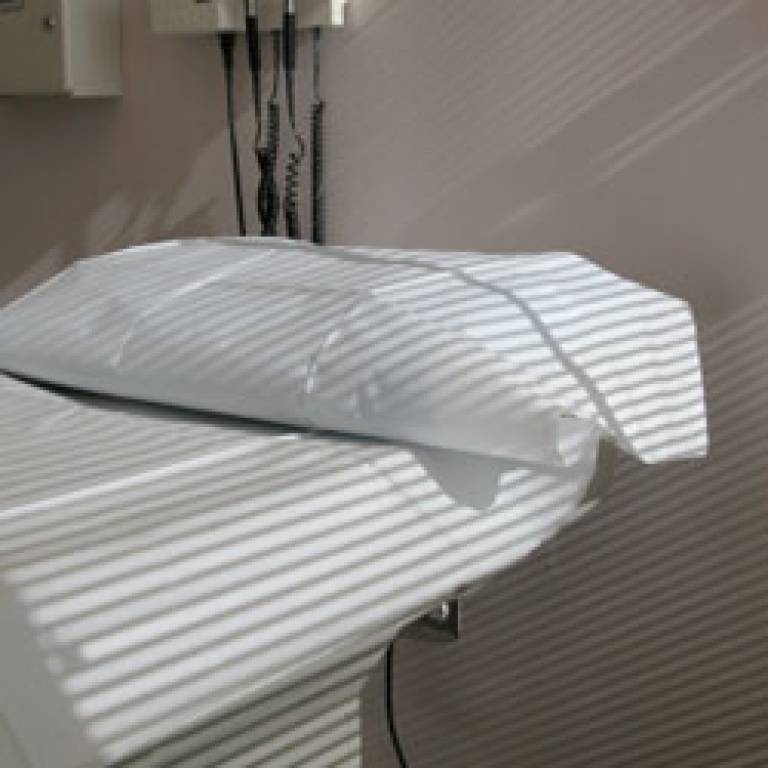'From bench to bedside': a new kind of PhD
10 December 2009
Links:
 ucl.ac.uk/iris/browse/profile?upi=BMCHA43" target="_self">Professor Benny Chain
ucl.ac.uk/iris/browse/profile?upi=BMCHA43" target="_self">Professor Benny Chain
A new PhD programme from UCL Immunology will give basic-science PhD students a flavour of the clinical context of their research.
'From Bench to Bedside', developed by Professor Benny Chain of UCL Immunology reflects the move to extend the PhD training period from three to four years in order to incorporate elements of taught programmes and, in particular, training in transferable skills.
Professor Chain explains what the programme will mean for students, and how changing the nature of learning within the clinical setting will affect future treatment and improve the patient experience.
What was the rationale for developing this new PhD programme?
I felt that many PhD students working on problems of basic science were completely unaware of the clinical context in which these projects were happening. For example, a student working on some detail of how HIV grows had no feel for how the growth of HIV impacted on individuals within the hospital and the real questions confronting the clinician responsible for such patients.
This seemed a serious issue given that one of the real strengths of UCL is its close links with an enormous diversity of clinical practice, through its historic and current close connections to UCL hospitals.
What will the key benefits be for students?
The students should gain in two ways. Firstly, they should gain a better appreciation of the clinical context of their projects. This will enable them to appreciate when their research could benefit clinical practice in some way. This is not to say they should work exclusively on problems requiring immediate clinical or practical output - but they should be aware when the basic research and the clinical challenge interact.
Secondly, good basic research can often learn from clinical situations - in effect, sick people act as 'natural experiments' from which a good scientist can learn an enormous amount. I hope the students will gain an appreciation of how their research can be enhanced by closer interaction with clinical colleagues.
In summary the bench/bedside link is a two-way road, and I really hope it is one the students will learn to be comfortable with.
How will the clinical component work in practice?
The details of the clinical component are being worked out by Professor Paul Griffiths, the course tutor, but the principle will be that each student will be assigned a clinical supervisor (an individual active in clinical activities) who will be responsible for making sure each student spends one to two days a month involved in some clinical activity. This could include attending clinics and multidisciplinary case meetings, or following diagnostics labs, for example. The enormous strengths of UCL hospitals in terms of their breadth, as well as the depth of their clinical activity, means there is a huge pool of expertise which the programme can draw on to provide material for the students.
What will students gain from the clinical context that they couldn't through conventional PhD training?
I believe that mentor-driven training is the backbone of PhD training in the UK, and that it is infinitely more valuable than providing additional traditional lecture courses. But there will now be two mentors - a lab mentor, and a clinician mentor. Each will provide the student with a very different perspective - the integration of these new perspectives provides a new and potentially original environment to shape the student experience. An additional benefit of the programme will be that these two sets of mentors get to interact with each other via the student, perhaps leading in some cases to future joint research.
What impact will this change in study format have on the future treatment of infectious and common chronic diseases?
The impact will be long term. In essence, we will be contributing to a workforce with the appropriate skills to facilitate successful translation of basic research into clinical benefit.
What are the timescales for developing the programme?
The first three students started at UCL in October, and will start their research project and their clinical training in March/April 2010. The advertisement for the next set of students will go out in the next few weeks. Demand for the programme has been very high - we selected three from around 80 applicants.
Will this programme be used as a model for other schemes?
The Medical Research Council was strongly supportive of the programme, and at least one member of the committee which reviewed the Medical molecular Virology Centre said that some aspect of the clinical training/awareness programme should be incorporated into all MRC-funded studentships. I hope UCL will gain some credit for pioneering this new direction.
UCL context
Research groups in the UCL Division of Infection and Immunity form part of either the Research Department of Immunology or the Research Department of Infection.
The Research Department of Infection was created this year to bring together the academic disciplines of Virology, Microbiology and Infectious Disease across UCL. The Department is within the Division of Infection and Immunity, facilitating collaboration with the Immunological specialties within the division. It also has close links with the affiliated Centre for Paediatric Infectious Diseases and Microbiology at the Institute of Child Health and The Eastman Centre for Microbial Infections at the Eastman Dental Hospital.
Related news
UCL researchers discover genetic cause of inflammatory bowel disease
 Close
Close

